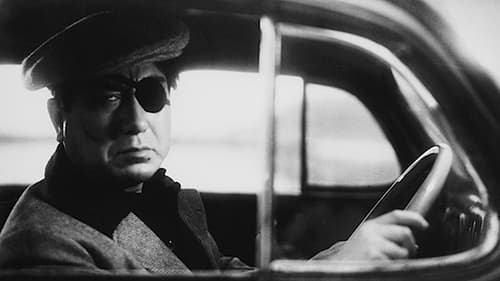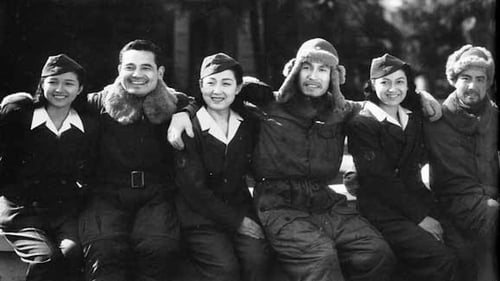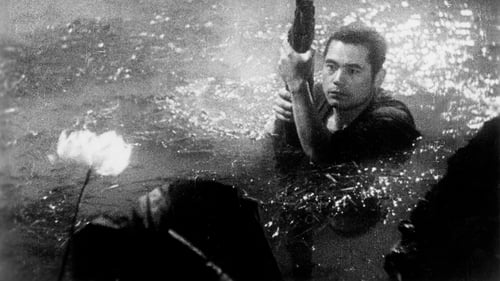Ko Yamamuro
Рождение : 1907-12-17, Kochi Prefecture, Japan

An exciting historical drama in which a beautiful woman secretly solves the family problems of the Owari clan. Hibari Misora plays two roles: a charming princess and a dashing youngster, performs songs and dances throughout the film until the big decisive battle.

Early adaptation of the book "The Inugami Clan", featuring the detective Kōsuke Kindaichi.

Movie version of NHK renzoku drama "Tokyo Romance"

First film of the The Black Hooded Man series.

Saburo Hirota
Fifth delivery in the Tarao Bannai series, following the "master detective with seven faces" who uses his signature disguise to solve crimes with a double-barreled pistol.

The second film in the 1953 trilogy based on the long novel series The Great Bodhisattva Pass.

The first film in the 1953 trilogy based on the long novel series The Great Bodhisattva Pass.

1952 Japanese film directed by Kunio Watanabe.

Thug

На землях замка Набэсима происходят странные вещи: люди напуганы криками страшной кошки, неизвестно откуда появляется доска для игры в го, которая становится причной раздоров и ссор, люди бесследно исчезают. Кто во всем этом повинен, призраки из иного мира или реальные злоумышленники, которые специально сеют панику и раздор?

A love triangle among a girl, her poor boyfriend, and a rich company president.

Writer Nemoto (as Ko Yamamuro)
A newly hired daily newspaper writer covering the society beat receives an assignment to cover Tokyo at night by walking and observing it. He gets into the right frame of mind by dressing the part as a vagrant with not a penny to his name. He gets into trouble ending up at the police station slammer overnight. He has no material to write about and, with his assignment unfulfilled, faces a cross editor.

Близится развязка войны. В тяжелые годы в Японии ведется подготовка женщин-радисток. В суровую зиму на далеком севере судьба сводит трёх выпускниц курсов радисток. От их слаженности и умения зависит выполнение важной военной задачи.

Продолжение похождений отважного дзюдоиста по имени Сугата Сансиро. На этот раз ему предстоит побороть новых соперников, включая белокожего волосатого боксёра, внешне, по мнению японцев, сильно похожего на обезьяну. Но герой сможет побороть всех противников, потому что его сила заключается не в ловкости тела, а в крепости духа.

Torakichi
Фильм повествует о развитии дзюдо в Японии конца 19-го века. В центре сюжета — молодой человек Сугата Сансиро, прибывший в большой город с целью изучать боевые искусства. Сначала он попадает в школу джиу-джитсу, но после того, как видит, что его новый наставник устраивает на своего конкурента — легендарного учителя дзюдо Сюгоро Яно подлую засаду и с позором оказывается повергнут им, Сугата упрашивает Яно взять его в ученики. Однако, путь воина, тернист и сложен не только своими физическими нагрузками, но и твёрдым моральным кодексом, подчинения которому требует Сюгоро Яно от своих учеников. Однажды из-за юношеской горячности преступив его, Сугата прыгает в пруд, повинуясь повелению учителя: «Умри!», и проводит в ледяной воде целую ночь. На рассвете он видит, как над поверхностью воды распускается цветок лотоса…

Assistant director
A 1943 film.

Date Masamune
A sentimental tale of the filial love between shogun Iemitsu (matinee idol Hasegawa) and his loyal old retainer Hikoza (comedian Roppa, playing somewhat against type).

Ine Onoda, the eldest daughter of a poor family of farmers, raises a colt from birth and comes to love the horse dearly. When the horse is grown, the government orders it auctioned and sold to the army. Ine struggles to prevent the sale.

This film attempts to reconstruct the tension of the Battle of Shanghai through an episode in an understated way, introducting its story in a documentary mode. In the film story, Japan's marine regiment protects Japanese residents and Chinese refugees-women and young children-from rampant street fighting, Shanhai Rikusentai unsparingly uses its first eight minutes for an official-mannered self-justification of the war. From the viewpoint of explaining Japan's military operation,the narration refers to the city s spatial division in sync with maps on screen.

A 1937 Japanese language film directed by Tomu Uchida, starring Ryo Akaboshi, Mitsuru Date and Hisao Furutani.

The Japanese equivalent of penny dreadfuls glorifying Jesse James, A Diary of Chuji’s Travels gives a unique gloss to the tale of Chuji Kunisada, the legendary bakuto (or gambler, the precursors to modern-day yakuza). One of the two remaining segments of Ito’s original four-hour trilogy, it depicts Chuji’s attempt to save the geisha Oshina, a rebellion against the rigid social structure of Edo Japan. With socialist overtones, it’s a passionate artifact of early Japanese film.











